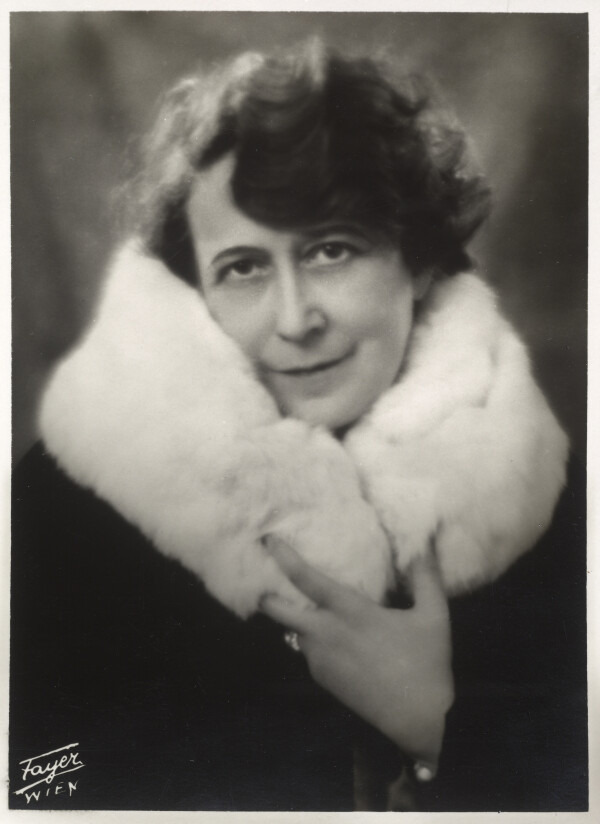Clara Pollaczek

Clara Pollaczek, around 1920, Austrian National Library, Vienna
© Picture Archives and Graphics Department, Austrian National Library
The Viennese writer and lyric poet Clara Pollaczek evidently corresponded with Gustav Klimt. She also socialized with the famous authors Hugo von Hofmannsthal and Arthur Schnitzler and had an affair with the latter.
Clara Pollaczek was born in Vienna in 1875. She was a daughter of the banker Louis Löb. She was tutored privately and began writing literature at an early age. She released her first literary works – including the provocative text Mimi. Schattenbilder aus einem Mädchenleben, which was published in the literary magazine Neue Deutsche Rundschau in 1897 – under a pen name. In May 1898, she married the wealthy Jewish industrialist Otto Pollaczek, born in Prague in 1873. They had two children. Her husband committed suicide ten years later – presumably because of financial difficulties – when he was only 35 years old.
It was not until the 1920s that she resumed her literary activities. She also worked as a translator. Pollaczek, who always used her middle name Katharina after World War I, enjoyed her greatest literary success with her contributions for the Neue Freie Presse. She lived in Prague after the “Anschluss” of Austria and in Switzerland during World War II. Clara Pollaczek emigrated to Great Britain after the end of the war. Three years later, however, she returned to her hometown Vienna, where she died in 1951.
Affair with Arthur Schnitzler
Clara Pollaczek had met the famous authors Hugo von Hofmannsthal and Arthur Schnitzler in person at a young age. In the 1920s, she began an affair with the latter, which lasted for several years and is documented in their extensive correspondence and her surviving diaries. Her typescript Arthur Schnitzler und ich, which is now preserved at the Wienbibliothek, was created after Schnitzler’s death in 1931. She also wrote several poems in his honor, which were published in the Neue Freie Presse on the occasion of his birthday and his remembrance ceremony.
Correspondence with the Artist Klimt
There is only one handwritten document, which was sold at an auction a few years ago, that proves that Clara Pollaczek also corresponded with the painter Gustav Klimt. The artist wrote the following message to the columnist:
“Unfortunately, I have plans for that evening – I hope you will not be angry that I am once more unable to accept your kind invitation. Please forgive me! – I fear I will be ‘unlucky’ and that you will not invite me again! Please be lenient – Happy holidays.”
Klimt did not date his letter. It is yet unclear if the personal invitation was for a private party or an event. The latter is not improbable, because Clara Pollaczek repeatedly acted as a patroness of the Wiener Kaufmännischer Ball, which was for instance held at the Sofiensäle building in February 1900 and in January 1901. It is possible that she invited Gustav Klimt to this event shortly before or at Christmas. Recent research, however, has dated the handwritten document between 1905 and 1910.
Literature and sources
- Neue Freie Presse, 15.05.1934, S. 6.
- Neues Wiener Tagblatt, 17.01.1901, S. 7.
- Neues Wiener Journal, 22.02.1900, S. 12.
- Neues Wiener Journal, 18.04.1908, S. 6-7.
- Die Neuzeit. Wochenschrift für politische, religiöse und Cultur-Interessen, 13.05.1898, S. 205.
- Ilse Korotin (Hg.): biografiA. Lexikon österreichischer Frauen, Band 3, Vienna - Cologne - Weimar 2016, S. 2564.
- Georg Gaugusch: Wer einmal war. Das jüdische Großbürgertum Wiens 1800–1938, Band 2, Vienna 2016, S. 2607-2609.
- Hansjörg Krug: Gustav Klimt selbstredend, in: Tobias G. Natter (Hg.): Gustav Klimt. Sämtliche Gemälde, Vienna 2012, S. 461-504.
- ÖNB. Ariadne. www.fraueninbewegung.onb.ac.at/node/2555 (05/14/2020).
- Felix Czeike (Hg.): Historisches Lexikon Wien, Band 4, Vienna 1995, S. 572.
- Stephan Kurz, Michael Rohrwasser (Hg.): »A. ist manchmal wie ein kleines Kind«. Clara Katharina Pollaczek und Arthur Schnitzler gehen ins Kino, Vienna 2012.

